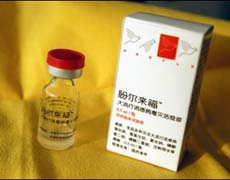
A vaccine against bird flu from Beijing-based
pharmaceutical company Sinovac Biotech is seen in this undated photo.
(AFP)
China has begun human trials of its homegrown bird flu vaccine with six
volunteers receiving shots, the Xinhua news agency said on Wednesday.
A total of 120 people, aged from 18 to 60 and all from Beijing and in good
health, had volunteered to take part in the trials, Xinhua said.
"After half an hour of clinical observation, the volunteers experienced no
bad reaction of either the whole or part of the body," the agency said.
Though the trials will need nine months of tests, initial results are
expected within the first three, it added.
Xinhua provided no further details.
China has had more than 30 outbreaks of the deadly H5N1 strain of bird flu
that scientists fear could mutate from a disease which largely affects birds to
one that can pass easily between people, leading to a human pandemic.
There have been 139 confirmed human cases of H5N1, all of them in Asia,
including six in China. Two people have died from bird flu in China, out of 71
known fatalities in Asia.
The head of the company researching the vaccine, Sinovac Biotech, told
Reuters last month that it was at least a year away from hitting the shelves.
Development of the vaccine -- called Panflu -- started last year after bird
flu outbreaks in Thailand and Vietnam and animal trials have already been
completed.
Experts say experimental vaccines for bird flu are unlikely to be a good
match for an H5N1 strain that may eventually emerge in transmissible form among
humans.
Using current technology it takes six months or more to make a new flu
vaccine and there is no way to predict what a pandemic strain might look like.
Currently, Roche Pharmaceuticals' Tamiflu is one of four drugs known to work
against influenza. It does not cure the virus but can reduce the severity of
infection and in some cases prevent infection.
Doctors believe it may help control a pandemic of H5N1, although evidence
suggests it may be less effective than it is against seasonal influenza.



